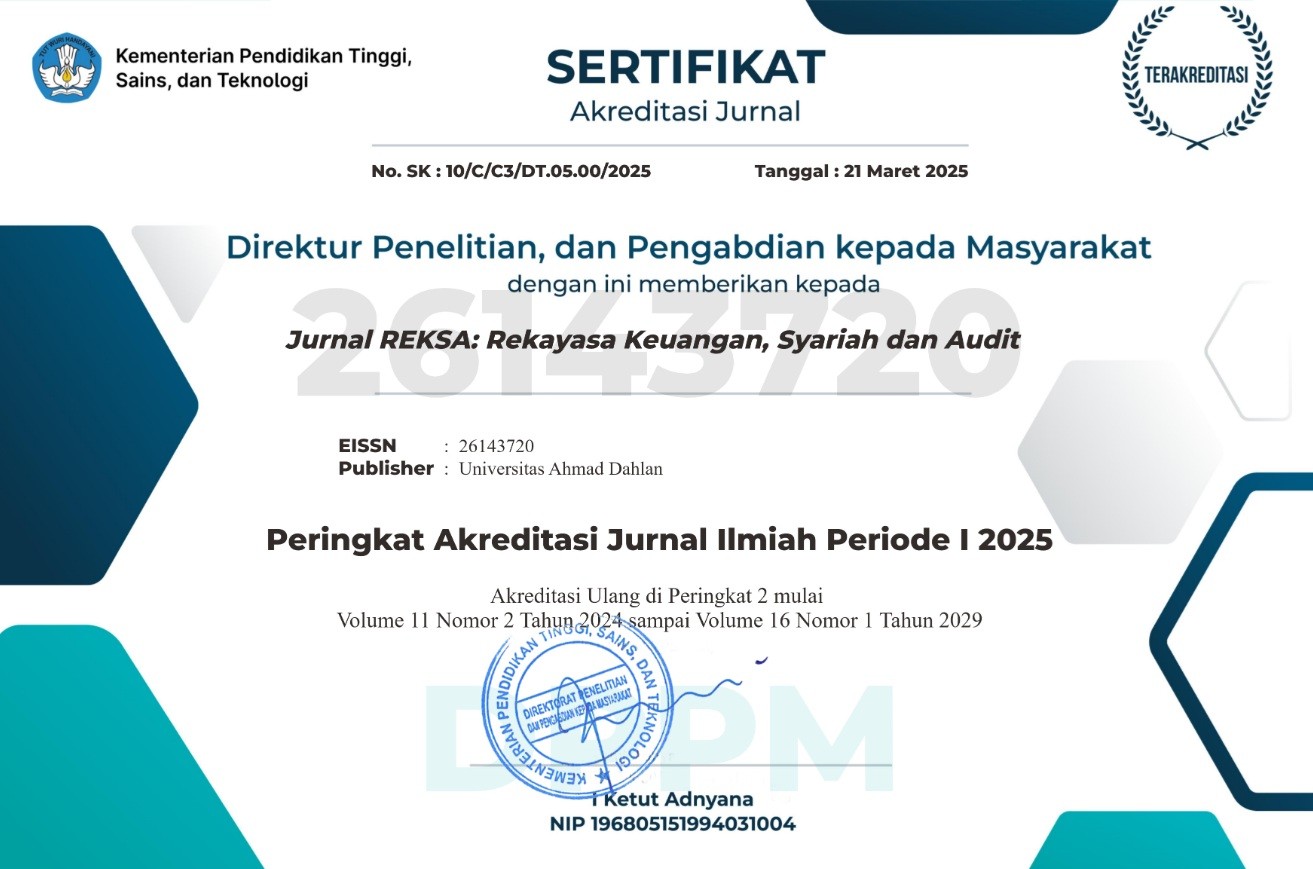PENGARUH LOCUS OF CONTROL, KOMITMEN PROFESI, BUDAYA ORGANISASI, KEPUASAN KERJA, SISTEM KOMPENSASI SERTA SIKAP INDEPENDENSI TERHADAP PERILAKU AUDITOR DALAM MENGHADAPI KONFLIK AUDIT Studi pada Auditor yang Bekerja di KAP Daerah Istimewa Yogyakarta dan Surakarta
DOI:
https://doi.org/10.12928/j.reksa.v3i1.30Keywords:
Locus of control, profession commitment, organization cultural, job satisfaction, compensation system, independence attitude.Abstract
This research aims to determine effect of locus of control, profession commitment, organization cultural, job satisfaction, compensation system and independence attitude for auditor behavior in face on audit conflict. The analysis based on the answer of respondents who available through of questionnaire that distribute by Yogyakarta and Surakarta Public Accountant Office. Population from the auditor research who work in the Public Accountant Office were in Yogyakarta and Surakarta. The research using the purposive sampling method. Sample taken from auditor who minimal has worked during 2 years. Cronbach Alpha used to test reliability data and testdata isused kolmogorov_Smirnovnormality. Hypothesis tested by multiple regression. Result from the research revealed that there are locus of control effect, profession commitment, organization cultural, job satisfaction, compensation system, independence attitude for auditor behavior in face on audit conflict.Downloads
Published
2018-07-04
How to Cite
Meliana, M. D., & Yuniarto, A. S. (2018). PENGARUH LOCUS OF CONTROL, KOMITMEN PROFESI, BUDAYA ORGANISASI, KEPUASAN KERJA, SISTEM KOMPENSASI SERTA SIKAP INDEPENDENSI TERHADAP PERILAKU AUDITOR DALAM MENGHADAPI KONFLIK AUDIT Studi pada Auditor yang Bekerja di KAP Daerah Istimewa Yogyakarta dan Surakarta. Jurnal REKSA: Rekayasa Keuangan, Syariah Dan Audit, 3(1), 107–128. https://doi.org/10.12928/j.reksa.v3i1.30
Issue
Section
Articles
License
Authors who publish with JURNAL REKSA agree to the following terms:
- Authors retain copyright and grant the JURNAL REKSA right of first publication with the work simultaneously licensed under a Creative Commons Attribution License (CC BY-SA 4.0) that allows others to share (copy and redistribute the material in any medium or format) and adapt (remix, transform, and build upon the material) the work for any purpose, even commercially with an acknowledgment of the work's authorship and initial publication in JURNAL REKSA.
- Authors are able to enter into separate, additional contractual arrangements for the non-exclusive distribution of the journal's published version of the work (e.g., post it to an institutional repository or publish it in a book), with an acknowledgment of its initial publication in JURNAL REKSA.
- Authors are permitted and encouraged to post their work online (e.g., in institutional repositories or on their website) prior to and during the submission process, as it can lead to productive exchanges, as well as earlier and greater citation of published work (See The Effect of Open Access).




